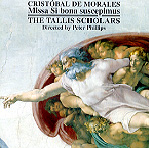With no offense to Morales, it’s tempting to suggest that top billing on this recording should go to the Tallis Scholars, and those listeners out there who have really missed this outstanding ensemble for the past couple of years know exactly what I mean. As one of the world’s premier early music vocal groups–with an original and immediately recognizable sound, and performances imbued with the most informed yet pragmatic scholarship–this group was responsible for re-discovering and introducing to modern listeners many Renaissance masterpieces, by composers such as Sheppard, Gesualdo, Cornysh, Cardoso, and Isaac, often providing its own performing editions from long-neglected manuscripts. Of course, this was in addition to presenting excellent new interpretations of masses and motets by masters such as Josquin, Byrd, Tallis, Taverner, Victoria, and Palestrina. And don’t forget the group’s initial release that featured a stunning performance of Allegri’s famous Miserere, in sound that brought us closer than ever to a live concert experience.
This release is the Tallis Scholars’ first new recording in two years–and it’s on the group’s original proprietary label, Gimell, returned to independent status after a disappointing association with a confused, disorganized, and crumbling Philips/Universal. All of this is good news, and whether you’re new to the Tallis Scholars or a long-time fan, you’ll find much to rejoice about in this, the first-ever recording of the six-part Missa Si bona suscepimus by 16th-century Spanish composer Cristóbal de Morales. Loyal followers will notice that most of the singers’ names are familiar ones from earlier years, and conductor Peter Phillips maintains the same high standards of scholarship and ensemble performance.
Natural sound always has been a hallmark of Gimell’s recordings, and this usually means a clear, detailed, unadulterated quality that joins the unique ambience of the venue (in this case the ideal acoustic of Norfolk, England’s Church of Saint Peter and Saint Paul, a Tallis Scholars favorite) with the group’s select voices and the specifics of the music’s texture and overall architecture. I notice the sound this time around is a bit more confined and slightly edgier or grittier than on the Tallis Scholars’ previous visits to this venue. Morales’ lean textures and a few new voices in the mix may have something to do with it, but still, I wished for a little more warmth and open air. I can’t complain even the slightest bit about clarity, however. And the drier sound probably enhances the powerful harmonic effects that blossom over and again throughout Morales’ expansive sections that seem to go on forever uninterrupted by cadences. Just listen to the buildup to the close of the Credo–the movement goes almost 13 minutes with barely a full stop! It’s as electrifying as sacred music of this period gets.
In spite of a long stint in Rome (he joined the Papal Choir the same day Michelangelo was commissioned to paint the Last Judgment!) Morales never gave up his true “Spanishness” in his music. His mass, written while in Rome, is a parody based on a motet by Philippe Verdelot. The disc begins with this motet and allows us to hear the magnificent things Morales did to it–essentially turning an elegant single orchid into a stunning, multi-colored tree-full. In his usual manner, Phillips and his singers “toss in” a splendid and rarely heard motet that until recently was misattributed to Morales but actually was written by Franco-Flemish composer Thomas Crecquillon. It’s one of those Renaissance wall-of-sound pieces that just washes over you in wave after wave. Based on the Tallis Scholars’ impeccably dressed and highly charged rendition, its first performance, for the 1546 meeting in Utrecht of the Order of the Golden Fleece–with no less than Henry VIII, Charles V, and Francis I of France in attendance–must have been something to hear and behold. And based on the pathetic dearth of Morales (or Crecquillon or Verdelot) in the current CD catalog–most of it on discs with music by other composers–this new release takes on even greater value. There’s much more to say about Morales and the music on this disc, but you’ll just have to read conductor Phillips’ customarily excellent liner notes–and listen. Welcome back, Tallis Scholars, Peter Phillips, and Gimell!
































